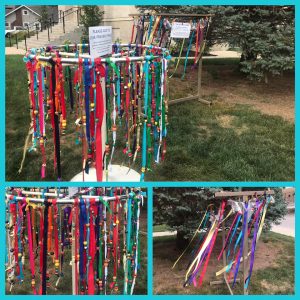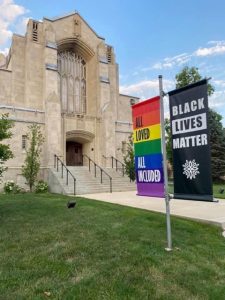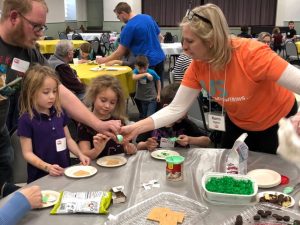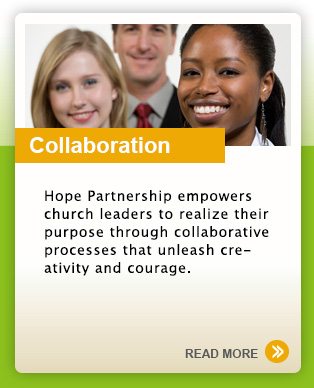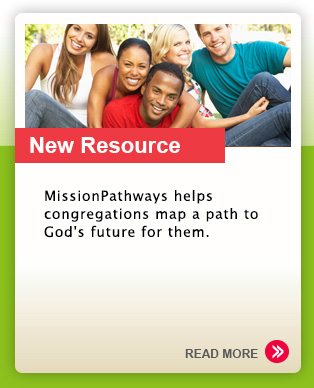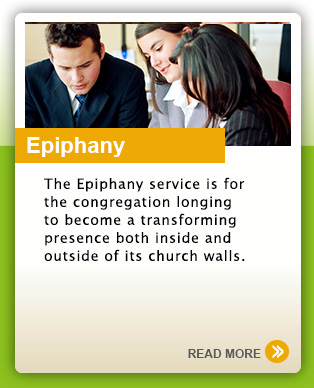A magnificent Indiana limestone church structure, adorned with towering stained-glass windows and heavy wooden doors, stretches the depth of the block at 47th and Central in Indianapolis.
Yet a gust of wind — not the building — reminds passersby of God’s work in the world through First Meridian Heights Presbyterian Church (FMHPC).
The wind moves colorful ribbons — embellished with bells and beads — that hang from a repurposed circular clothing rack on the church’s front lawn: the congregation’s “prayer chimes.” The popular, neighbor-friendly fixture invites church members and pedestrians alike to choose beads that represent people or issues they’d like to pray for, tie them onto a ribbon, and attach them to the rack.
In the Meridian-Kessler Neighborhood, the chimes offer a resounding affirmation of the continuing call to ministry of this 200-year-old congregation — especially in the chaos of a pandemic.
Help from History?
Born from a 1970 merger of First Presbyterian Church and Meridian Heights Church, FMHPC’s legacy includes membership of U.S. President Benjamin Harrison. Yet that history offered little help when too-frequent leadership changes began to erode membership levels.
By 2017, faced again with the need to call a new pastor, First Meridian Heights members knew their remarkable heritage and stately structure could not sustain the ongoing ministry.
One member had an idea.
Then-director of marketing at Disciples Church Extension Fund (DCEF), Katie Marlowe had a hunch about Epiphany — a process of DCEF’s Hope Partnership Services. She had seen it help Christian Church (Disciples of Christ) congregations longing to become a transforming presence in the world. Surely it would work for a Presbyterian congregation.
With Katie’s encouragement, FMHPC opted to undertake the Epiphany service as its “mission study” — one of the early steps in the Presbyterian pastoral search process.
From ‘What’ to ‘Why’
“Those were good days. We got lots done with that,” remembers Katie. “They were safe conversations. People felt willing to express concerns and opinions.”
From those discussions, Katie and a small group of members, like John Melind, wrote a “Future Story,” envisioning what their faith community could look like in 2023.
Born into First Meridian Heights, with a family heavily involved in its ministries, John envisioned a church connected with God’s mission by “doing things outside of the walls of the church.”
The church began to experiment in living out its mission beyond the grand building — including expanding their church garden and donating the produce to a neighborhood food pantry.
First Meridian also invited neighbors to connect through Messy Church, a monthly event where parents and their children explored faith through crafts, storytelling and a shared meal.
Rev. Kim Olson accepted the call as the new pastor, with DCEF facilitator, Ruth Fletcher, serving as her coach.
Didn’t Count on COVID-19
Just as the congregation began living into its imagined future, the pandemic hit.
“We had a few sessions to focus on the future, and then the lockdown happened,” remembers Pastor Kim.
At least having a coach in a pandemic was a blessing.
“A lot of things (church leaders) talked about — steps we might take to help bring the Future Story to life — were impossible (in the face of the virus). It was helpful to process things with Ruth.”
Casualties of the pandemic included nonprofits like the local food pantry — where First Meridian members were donating and volunteering. It closed rather than risk the health of volunteers. Eventually it reopened as a drive-through, allowing volunteers to continue donating food.
“The pandemic has forced our leaders to be creative,” says Rev. Kim. “In some ways, it also helped us focus. We began to say things like: ‘Here’s what we’re good at,’ and ‘Here’s what we can do right now.’”
In the midst of the upheaval, the tools the congregation learned through the Epiphany process proved vital.
“The Epiphany process gave us something, as a leadership body, to shoot for in rebuilding our congregation,” says Elder Muuka Muyumba.
Despite the loss of the food pantry, the garden ministry continued as an area of focus. With unemployment skyrocketing, and schools closing, neighborhood need only increased. The garden helped feed households in need in the crisis.
Meanwhile, with in-person worship and fellowship opportunities curtailed by the pandemic, the congregation started offering daily prayers on Facebook Live. Followers and friends tuned in from cities across Indiana and other states.
And the prayer chimes? It turns out they were no small part of the evolving ministry of First Meridian.
“With our prayer chimes, we’re becoming identified as the church that makes the sound on the outside,” says Katie. “How cool is that? Isn’t that what churches are supposed to be?”
Is your congregation looking for a way to re-imagine its ministry in a changing and challenging context? Complete this survey to see if Epiphany is right for you.

